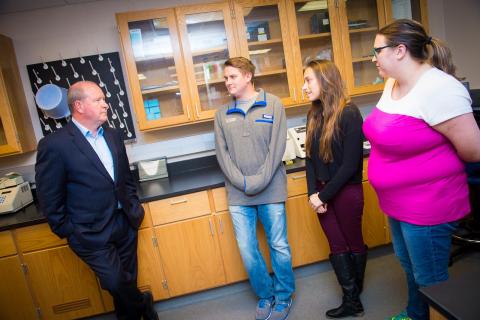
Indiana State's genetics counseling program is the 33 of its kind in the country and second only in Indiana.

Indiana State's genetics counseling program is the 33 of its kind in the country and second only in Indiana.
U.S. Rep. Larry Bucshon recently toured Indiana State University's new genetic counseling labs, home to a new and highly competitive graduate program.
"I took genetics 34 years ago," said Bucshon (R-Taylorville) with a laugh.
Professor Rusty Gonser showed Bucshon on Oct. 19 the purified water supply system and even introduced Bucshon to Assistant Professor Shaad Ahmad and his "A-Team" of eight research students. In a small, dim room, they watched a fruit fly's heartbeat through a high-powered microscope.
Gonser explained the alphabet of the genome to Bucshon and "how DNA is like a candy bar -- if you take off enough pieces, there is none of it left," said Gonser. "But cells can be cultured and potentially provide an unlimited source of DNA for an individual."
Gonser showed Bucshon the room where genomes are decoded and even the genetic counseling student office and lounge. The rooms require key-card access are designed to meet HIPAA standards.
"The whole campus has been on board with this. We wouldn't be here without a lot of faculty effort," Gonser said.
One machine can send genome results to your phone and was initially run off an iPod. One machine is named "Ion Chef," and another is "Big Papi." Gonser warned that a lot of the equipment was named after Red Sox players.
"I was a doctor before, so I'm interested in this sort of thing -- microscopes and hoods and all those types of stuff. Especially the gene sequencing stuff, the equipment, how that works and how fast that technology is advancing is really important," Bucshon said, stating genetic counseling programs are aiding the development of precision medicine, where medical therapies are individualized. "I'm impressed about the support that Indiana State has given this particular program. I mean, it seems like it's a really tremendous thing."
After Gonser finished the tour, Bucshon asked, "The only question now is, how can I help?"
Gonser discussed the genetic counseling clinic that was started in collaboration with Union Hospital and offered the idea of a "frozen zoo" on campus -- which refers to a storage facility where genetic materials are stored at low temperatures in liquid nitrogen so that they can be preserved for long periods of time or reprogrammed into stem cells.
Bucshon is on the Energy and Commerce Committee's health subcommittee, 21st Century Cures.
"So part of that is try to figure out how the federal government can be helpful to try to get precision medicine out there to everybody," Bucshon said. "Also as a medical doctor, it's important to understand if you're going to make healthcare policy, it's just an overall ‘gestalt' -- an overall feeling about what's out there and what people are doing in this area."
Bucshon has also been in the National Institute of Health, which helps fund research initiatives. He has met Francis Collins, the director of NIH, "who is one of the lead guys -- if not the lead guy on the Human Genome Project," said Bucshon, who added his doctors' group travels to NIH a couple of times a year to hear Collins speak.
Fifteen years ago, it took the Human Genome Project 10 years to sequence the human genome. Now, in the genomics lab at Indiana State, a person's genome can be sequenced in four hours. State's program is the 33 of its kind in the country and second only in Indiana.
"It's crazy how fast things go, isn't it?" Bucshon said, referring to the pace of genetics research.
"Any time as a legislator you can back up your case for getting more finances to researchers like at the NIH, you can back that up with what's happening out there -- say, ‘Hey look, this isn't hypothetical, they're really doing it!'" Bucshon said. "So that's why this is good."
When asked how genetic counseling may have impacted the world of cardiothoracic surgery if it had come along when Bucshon still practiced, Bucshon replied, "I think so, yeah. There's genetic components to why certain people develop heart disease, why certain people have a high cholesterol, why certain people develop coronary blockages while others don't, even though they have the same risk factors... So if you can start working towards figuring out what those genetic components are, of course, you might be able to mitigate development," he said.
Bucshon also says it will help teach people at a young age to change their habits to avoid developing heart disease and other issues. He says this early mitigation will keep some people from needing surgery down the line, which will save "the whole system money."
-30-
Photos: https://photos.smugmug.com/Events/Events-by-Year/2016/Larry-Bucshon-Visit-2016/i-PvjqgBC/0/X3/October%2019%2C%202016%20Larry%20Bucshon%201876-X3.jpg -- U.S. Rep. Larry Bucshon (R-Taylorville), left, speaks with biology Professor Rusty Gonser in the genomics labs at Indiana State University on Oct. 19.
https://photos.smugmug.com/Events/Events-by-Year/2016/Larry-Bucshon-Visit-2016/i-zDsR9Sz/0/X3/October%2019%2C%202016%20Larry%20Bucshon%201912-X3.jpg -- U.S. Rep. Larry Bucshon (R-Taylorville), left, speaks with Indiana State University students in the genomics labs on Oct. 19.
Contact: Rusty Gonser, professor of biology, College of Arts and Sciences, Rusty.Gonser@indstate.edu or 812-237-2395
Writer: Kristen Kilker, media relations assistant, Office of Communications and Marketing, kkilker@sycamores.indstate.edu or 812-237-3773